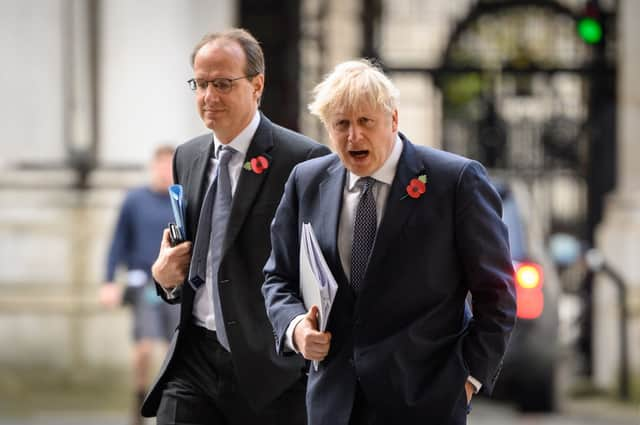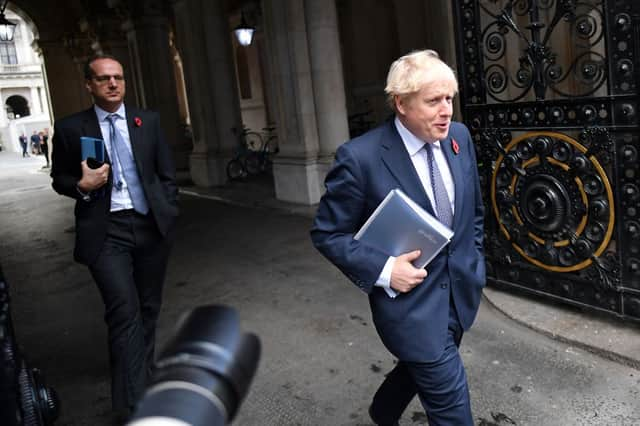Covid Inquiry UK: who is Martin Reynolds? Ex-official at centre of Partygate gives evidence - what did he say?
and live on Freeview channel 276
The former civil servant Martin Reynolds, who sent the infamous "bring your own booze" email, has apologised to the Covid Inquiry for his role during the Partygate scandal.
The 54-year-old was Boris Johnson's Principal Private Secretary between October 2019 and March 2022, but has never before spoken publicly about his role with the Downing Street bashes during the coronavirus pandemic. He largely avoided the limelight until the emergence of his email inviting colleagues to “socially-distanced drinks” during England’s first coronavirus lockdown. Further criticism was levelled at him after Sue Gray’s highly-anticipated Partygate report was published and showed he had told colleagues they had “got away” with hosting the illegal gatherings.
Advertisement
Hide AdAdvertisement
Hide AdGiving evidence today (30 October), Reynolds said "I would like to apologise unreservedly to all the families of all those who suffered during Covid for all the distress caused". During the session, he also admitted turning on a function which made his WhatsApp messages disappear two weeks before Johnson announced there would be an official Covid Inquiry.
Reynolds speculated it was because he was worried about people screenshotting his messages. Rishi Sunak's official spokesman has said that the use of disappearing WhatsApp messages continues to be permitted. He said: "The use of disappearing messages is permitted as civil servants and ministerial private offices are required to record and log official decisions and views for the record, where it is relevant and appropriate.”
After Reynolds' evidence, Dominic Cummings, Johnson's former chief adviser, will speak on Tuesday (31 October). This is part of the second phase of the UK's Covid-19 inquiry, which has the goal of establishing how effective the UK government's leadership and decision making was in controlling and restricting the virus.
Who is Martin Reynolds?
A British civil servant, Martin Reynolds was formerly the UK’s ambassador to Libya, and was Principal Private Secretary to the Prime Minister from 2019 to 2022. Before entering government, Reynolds worked as a lawyer in London, and became a diplomat, serving at the British High Commission in Pretoria, South Africa as Deputy High Commissioner, from 2011.
Advertisement
Hide AdAdvertisement
Hide AdIn 2014, Reynolds became the Principal Private Secretary to the Secretary of State for Foreign and Commonwealth Affairs, for part of that time while Boris Johnson was Foreign Secretary. Reynolds was Ambassador of the United Kingdom to Libya for five months between April and September 2019.
Reynolds was recalled from his overseas posting in Africa after Peter Hill resigned from his role as Principal Private Secretary to the Prime Minister following Johnson’s becoming Prime Minister 2019. He was officially instated in his role in October 2019.


What did he say to Covid Inquiry?
Martin Reynolds started giving evidence to the Covid Inquiry this morning (30 October). A WhatsApp exchange between Reynolds and Cabinet Secretary Simon Case from December 2021 was shown at the start of the session.
A message from Case read: “PM is mad if he doesn’t think his WhatsApps will become public via Covid inquiry – but he was clearly not in the mood for that discussion tonight! Well have that battle it the new year.”
Advertisement
Hide AdAdvertisement
Hide AdReynolds replied: “Agree – thanks for your help.” Reynolds was asked by Hugo Keith KC, lead counsel to the inquiry, what that “battle” was about.
He replied: “I cannot recall, but I imagine that the prime minster – I’m afraid I can only speculate – but I imagine he hadn’t realised that all of his WhatApps would become public via the Covid Inquiry.”
Keith added: “Because of course as the then prime minister, his WhatsApps would form a vital part of a full, transparent examination of the decision-making at the time – as yours would?” Reynolds replied: “Yes.”
The inquiry heard that Reynolds had turned on a 'disappearing message function' on WhatsApp on 15 April 2021, around two weeks before Johnson announced the Covid Inquiry. Reynolds said that he may have been worried about colleagues screenshotting the messages. When pressed on the matter, he said: “I can guess or I can speculate, but I cannot recall exactly why I did so.”
Advertisement
Hide AdAdvertisement
Hide AdHe continued: “This WhatsApp group was very different from any other WhatsApp group on my phone, in that it was essentially funnelling information into the Prime Minister and out, and all of that was recorded separately in hard copy or in email form – including the Prime Minister’s comments. So, that flow of information of updating him on developments was recorded properly on our systems.


“I can speculate as to why I might have done it. As I said at the start, I have kept all my other WhatsApps for the relevant period and handed them over, so I don’t believe it was intended to prevent the inquiry from having sight of this. It could, for example, have been because I was worried of someone screenshotting or using some of the exchanges and leaking them.”
Keith asked Reynolds about the "inexperience" of the government to respond to the pandemic, asking: “To what extent was Mr Johnson’s administration in January and February of 2020 an inexperienced one … that might, because of the novelty, and of course the general election … (have been) unable structurally to be able to cope with a crisis of this magnitude?”
Reynolds replied: “I think it’s fair to say that the dynamics in January, February, March of 2020 were very different to the dynamics before the election. There had been a very big shift in overall focus pre-election on Brexit and the Brexit negotiations and that had been … the overriding focus of that entire period for three or four months, and that had been concluded, the election had happened and there did feel like there had been a significant turning of the page. Because with a majority of 80 or whatever it was there was a sense that the government had a five or 10-year time horizon to look at and there was a really strong focus on the forward agenda.”
Advertisement
Hide AdAdvertisement
Hide AdReynolds added that there was "unease" around a "s***list" of civil servants who "were thought to be risks in what was perceived to be a potentially more muscular approach to the civil service.” He singled out former Chief of Staff at Downing Street Cummings, saying: “In my view, he was the most empowered chief of staff Downing Street has seen and was the person whose writ ruled, who was able to drive things through the machine in the way I suspect few other chiefs of staff have done.”
Before the inquiry broke for lunch, Reynolds said that Johnson blew "hot and cold on some issues" surrounding the pandemic. Keith had asked about how the Prime Minister "oscillated in terms of what should be done, he wondered whether he should be regarded as the ‘mayor in the Jaws film’ – shutting the beaches". Reynolds said the government "wasn't ready for the crisis" and so responded in a very "ad-hoc" way.
What did Reynolds do?
As Boris Johnson’s Principal Private Secretary, Reynolds played a key role advising the Prime Minister on a wide range of issues. Johnson’s former adviser Dominic Cummings said the influence wielded by the principal private secretary within Downing Street was not widely appreciated.
“The PPS exercises far more influence and actual power over many issues than Cabinet ministers,” Cummings said. “He can nudge policy, he can nudge vital appointments (real power). He can and does walk into the PM’s office and exclude all political people ‘on security grounds’.”
Advertisement
Hide AdAdvertisement
Hide AdWhat happened with Reynolds during Partygate?
Reynolds sent an email to more than 100 Downing Street employees inviting them to drinks in the garden on 15 May 2020. He said staff should “make the most of the lovely weather”, despite the country being under tough coronavirus restrictions banning groups from meeting socially outdoors when the message was sent.
The leaked email, obtained by ITV news, said: “Hi all, after what has been an incredibly busy period we thought it would be nice to make the most of the lovely weather and have some socially distanced drinks in the No 10 garden this evening. Please join us from 6pm and bring your own booze!”
Boris and Carrie Johnson as well as Dominic Cummings were pictures attending this event. Around 55 minutes before the party is believed to have begun, Cabinet Minister Oliver Dowden tells the public at a press conference to “limit contact with other people” and said: “You can meet one person outside of your household in an outdoor, public place — provided that you stay two metres apart.”
Reynolds was heavily criticised by opposition politicians following the publication of the leaked email invite. On 3 February 2022, Reynolds announced he was resigning from Downing Street, being replaced by Peter Wilson as the Prime Minister’s principal private secretary on 8 March.
Advertisement
Hide AdAdvertisement
Hide AdHowever he was further embroiled in the Partygate scandal, after the Sue Gray report showed that he has messaged colleagues stating that they had “got away with it”. In one email, which was included in the official Partygate inquiry, Reynolds told a colleague: “Best of luck, a complete non story but better than them focusing on our drinks (which we seem to have got away with).”
What did Reynolds say about Partygate?
When giving evidence to the inquiry, Reynolds apologised for his role in the Partygate scandal. He said: “I would first like to say how deeply sorry I am for my part in those events and for the email message, which went out that day. And I would like to apologise unreservedly to all the families of all those who suffered during Covid for all the distress caused.”
The inquiry heard that Johnson's Director of Communications Lee Cain had warned Reynolds that this would cause "rather substantial comms risks", saying that "I don't see how we can have some kind of party".
Reynolds added that the invitation he had sent had less impact on public confidence because details of it emerged later. He told the inquiry: “It actually broke into the news about 15 months later. So while I totally accept… I was totally wrong in the way I sent the email around and for the event, I think the impact on public confidence – although obviously now in terms of public confidence, more generally it did have a serious impact – in terms of the pandemic at that time it was less, it had less impact.”
Advertisement
Hide AdAdvertisement
Hide AdBefore closing the session, Hugo Keith KC told Reynolds: "You realise of course that for the public whose loved ones were dying in their droves, this caused incredibly offence and added to their immeasurable pain."
Comment Guidelines
National World encourages reader discussion on our stories. User feedback, insights and back-and-forth exchanges add a rich layer of context to reporting. Please review our Community Guidelines before commenting.